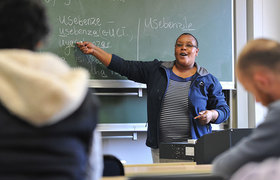Careers Service: Guided journey from school to work
27 July 2015
The 2014 Graduation Destination Survey conducted by the Careers Service in CHED showed that 44% of UCT's graduating class* was already employed by the time they stepped up to the graduation podium to be capped. And those with postgraduate degrees fared better in the employment stakes, with the employment rate for PhDs at 63% at the time of graduation.
According to the survey, 55% of the students who had found jobs would be earning in excess of R15 000 a month. And gratifyingly, 79% of the respondents said their degree was directly related to their job.
These statistics are encouraging against a macro-economic picture of persistent unemployment in the country. In the first quarter of 2014 the national unemployment rate was 25.2% (Stats SA Quarterly Labour Force Survey).
The statistics for youth are even more sobering. According to Stats SA, 67% of all unemployed South Africans are youth. They face the most difficult challenges in South Africa's labour market.
But it's not just a local problem; a global phenomenon, unemployment has become more acute since the financial crisis of 2008. A degree may give students an advantage, but despite expanding access to universities in sub-Saharan Africa, there are concerns about the quality of these qualifications and graduates' preparation and readiness for the workplace.
It's in this space that the Careers Service works, helping students to make the most of their university experience. (In the 2014 survey, 90% of the respondents reported they were satisfied with their learning experience at UCT.)
Skills and knowledge
What makes a graduate (or anyone else, for that matter) employable?
Wikipedia describes employability as "... a person's capability for gaining and maintaining employment. For individuals, employability depends on the knowledge, skills and abilities they possess, in addition to the way they present those assets to employers".
Much of this statement is embodied in the unit's work. Here, students learn that it takes more than a solid academic record to succeed; they also need to develop some relevant work experience and extra-curricular activities, such as socially engaged or volunteer work. Their mission is to support students' careers by helping them realise their potential and contribute to their communities in a meaningful way.
Careers Service director David Casey believes this starts from day one in first year.
"We take students through the paces of developing career management skills by providing information, advice and opportunity services, achieved through a well-resourced Careers Information Centre, workshops, part time work opportunities, employer events and recruitment programmes."
The unit offers a wide range of services and resources to help students at any stage of study with all aspects of career and job-search planning.
"We can help students from first year explore their career options, expose them to personal and professional job development opportunities such as part-time work, internships, graduate jobs, careers expos and employer showcases," said Casey. "We also help them compile job search material such as CVs and cover letters."
In a 'bottom-up' approach, the unit are also looking to build career awareness into the university curriculum. In commerce, for example, there's a credit-bearing course, Careers Discoveries, aimed at helping first-year students think through their career choices and possibilities.
Careers advisors deliver seven other careers-related modules in partnership with academics in other courses.
For many students, the help they get goes beyond addressing statements such as "I don't know what I want to do when I graduate' or "I like what I'm studying but I'm not sure where it's taking me".
The service extends from helping students prepare good cover letters right through to tips for interviews, even going as far as holding mock interviews to prepare students for the real thing.
The Careers Service also helps high school learners make more informed decisions for their lives after school – through one-on-one sessions, large school talks as well as interactive workshops for smaller groups. Aptly called Beyond School, this service helps learners consider what goes into building a career (as opposed to choosing a career), are equipped to make more informed career choices, and gain a better understanding the complexities of the 21st century working world. The Careers Office also offers Beyond School education workshops for teachers and youth workers (and UCT students) that looks more specifically at key issues learners face (and how to help them), the current world of work, and aspects of career development theories.
Their vision is simple, says Casey: to be the leading African careers service, recognised globally for innovation, quality and impact.
Did you know?
The Careers Portal can be accessed at careers.uct.ac.za, which allows students 24/7 access to the Careers Service offerings. MyCareer allows UCT students to book 15-minute careers advisory appointments, and search for full-time jobs, as well as vacation and part-time work, and bursaries or scholarships. They can also participate in employer networking events each semester, or sign up for events and skills sessions.
Story by Helen Swingler. Photo by Michael Hammond.
 This work is licensed under a Creative Commons Attribution-NoDerivatives 4.0 International License.
This work is licensed under a Creative Commons Attribution-NoDerivatives 4.0 International License.
Please view the republishing articles page for more information.










